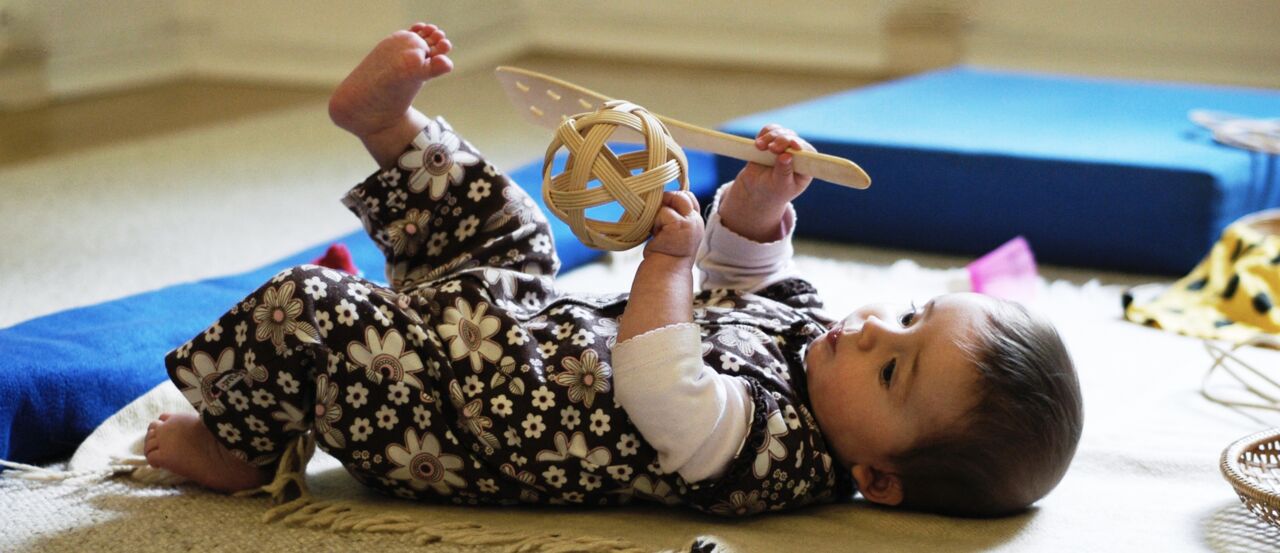
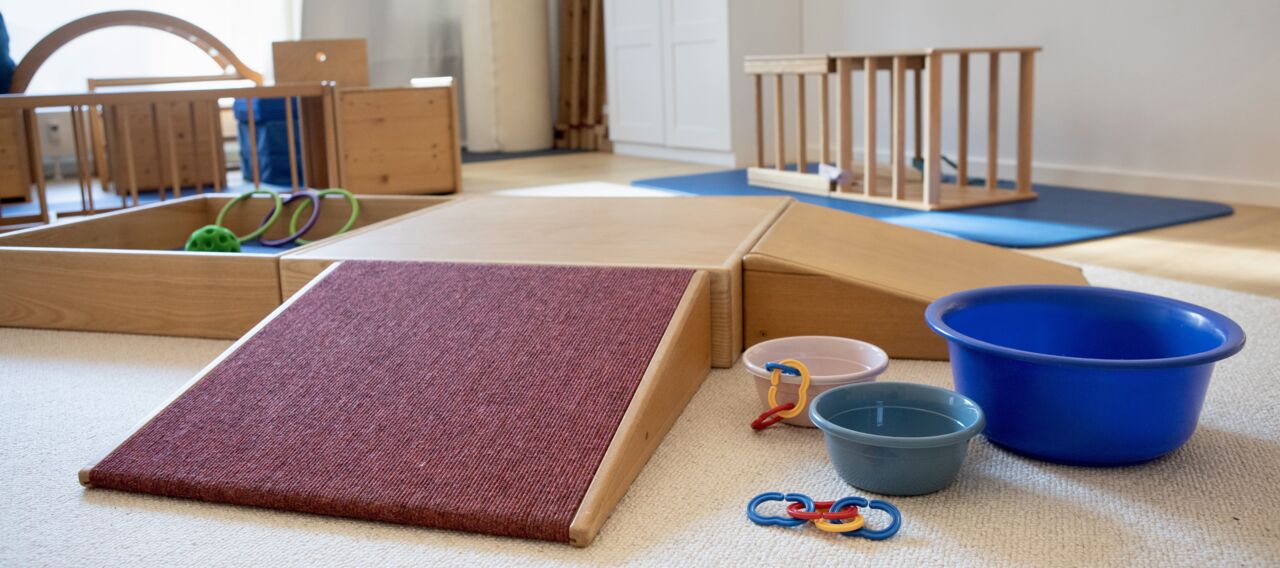
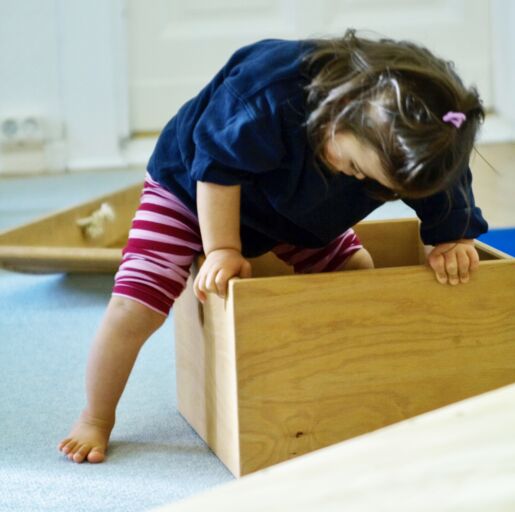
Therapy Offer
Motivation arises when a child finds appropriate activities according to their development, in an emotionally safe atmosphere that awaken their desire to experience themselves in their environment. The physiotherapy practice is exclusively focussed on the needs of children. We treat young patients of all health insurance companies and private on medical prescription. We are trained in the Bobath therapy concept for children and supplement this with other methods such as Psychomotor Activities, Craniosacral Techniques, Three-dimensional Manual Foot Treatment, etc. But above all through our decades of experience with the development and diverse needs of young children and their families!
- Bobath Physiotherapy for babies and children
- Psychomotoric activities
- Three-dimensional Manual Therapy by Zukunft-Huber
- Craniosacral Techniques
- Assessment of the child's development
- Consultation for parents
- Advice about free movement according to Emmi Pikler
- Encouraging physical activity according to Elfriede Hengstenberg
- Yoga for children
Examples of Various Diagnoses and Enquiries
Here is a list of some of the diagnoses and enquiries which we see during our everyday practice. Sometimes questions arise whether a baby is gradually developing differently from others or whether maybe there is a medical problem. Exact observation criteria and our many years of experience with babies and young children helps us with our assessment and therapy planning. It is mostly often necessary to get to know the child comprehensively: Is the child motivated to move and to develop? How does it play? How are the communication abilities? Can it adjust itself? Which character does it have. What does it need to take the next step in its development?
We support and encourage each child individually and comprehensively in order to achieve sustainable results.
- statomotor developmental delays
- Flat head syndrome / Plagiocephaly
- Premature babies with motor problems and impairment of regulation, restless children
- Genetic defects and syndromes such as Down syndrome, Noonan Syndrome,
- Prader-Willi Syndrome and further more
- Neurological conditions / central and peripheral nervous system
- Defined developmental disorder of motor functions
- Orthopedic diagnosis, such as Hip dysplasia, foot misalignment,
- constant walking on tiptoes, Scoliosis, Arthogryposis.
- Rheumatism in children
- Clumsy child syndrome
- Muscular hypotonia
- coordination disorders
- Difficulties in regulation of the muscle tonus
- Perceptual disorders
- Difficulties in regulation
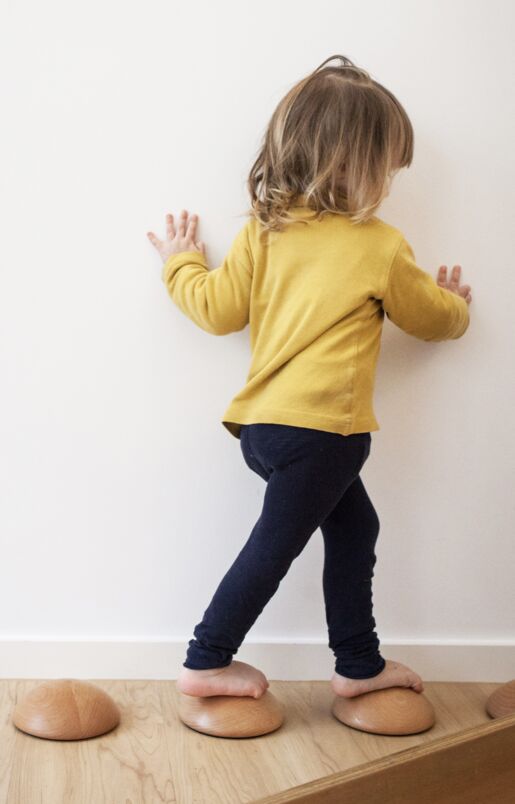
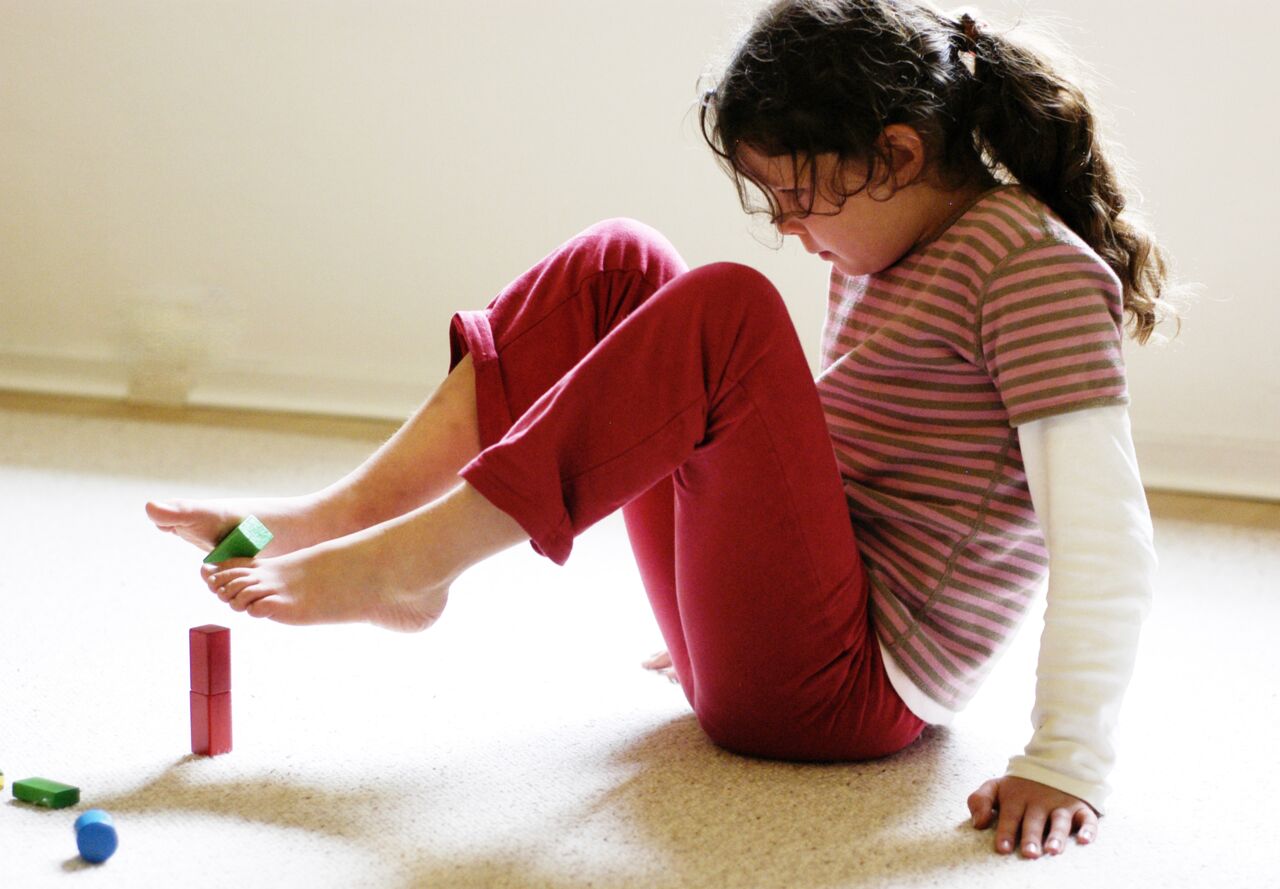
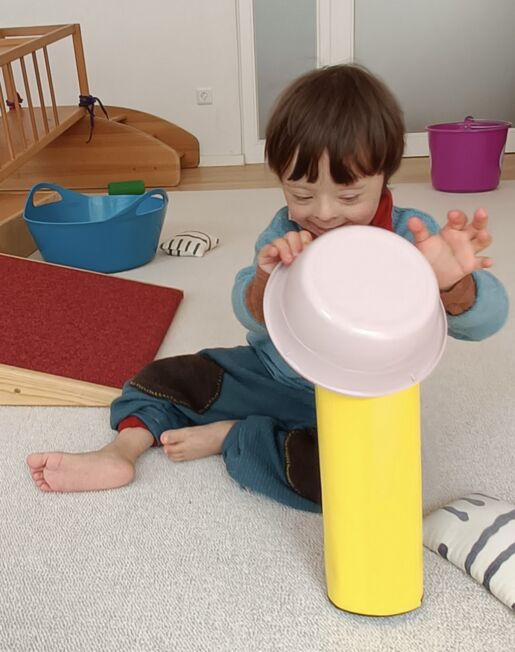
About Us
The pediatric practice in Wartburg street near Bayerischer Platz was founded in 2006 by Anja Werner. Together with Monika Aly, who contributed her many years of therapeutic and counseling experience, and the Pikler Gesellschaft Berlin e.V., we created a place for children, parents and professionals.
Therapy for children, consultations with parents, group offers for children and adults, further education and training for therapists and preschool teachers can take place here.
Susanne Schagen has been supporting us for many years in our physiotherapy team and as a colleague in the Pikler Association.Our involvement with the early childhood pedagogical principles of Emmi Pikler helps us to work in a resource-orientated and holistic way that promotes development.
The principles of Emmi Pikler and Elfriede Hengstenberg which emphasize respect for the child's own initiative, characterize our respectful attitude and our therapeutic approach:
We use our knowledge and many years of experience to enable and support the next step in the child's development. However, the child always remains the self-determined actor in its development. The practice rooms are generously equipped with Pikler and Hengstenberg materials. This enables us to create a stimulating and individual movement environment for each child and provide specific developmental stimuli. We accompany and support your child in discovering and expanding their diverse skills.
The majority of our young patients are between 0 and 6 years old. We are therapeutic and educational specialists for early childhood.
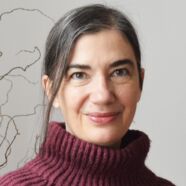
Anja Werner
- Physiotherapist for children (Bobath) and Pikler lecturer
- Many years of working in the children and youth outpatient department of the Pikler Association Berlin e.V.
- 2006 the practice Beweggründe was founded
- Lecturer for various supporting institutions in Germany and abroad
- Assistant for Pikler courses with Anna Tardos, Budapest
- Participation in supervision groups with Anna Tardos and Monika Aly for several years
- Participation in Hengstenberg seminars and courses with Ute Strub
- Self Experience on a regular basis in the Jacoby-Gindler-Stiftung Berlin
- Second chairperson of the Pikler Gesellschaft Berlin e.V.
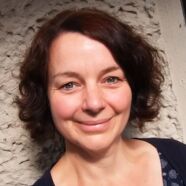
Susanne Schagen
- Physiotherapist and Pikler Pedagogue (ongoing further training)
- Bilingual, English / German
- Further education as a Bobath Therapist for children in London
- Many years of experience working in various physiotherapy practices for children, in various schools in Berlin as well as working in the practice for children of Charlotte Mühlinghaus in Potsdam
- Further training in activities for psychomotor skills, Yoga for children, Three-dimensional Manual Therapy for the feet by Zukunft-Huber and Cranio-Sacral techniques
- Case-supervision on a regular basis with M.Aly and A.Werner
- Member of the Pikler Gesellschaft e.V. in Berlin and Pikler Association UK
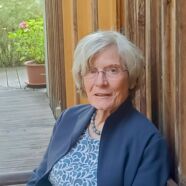
Monika Aly
- Physiotherapist for children and Pikler lecturer
- For more than 40 years working with children with neurological and psychomotor skills problems ( Bobath, Milani-Comparetti, Ferrari, Prechtl)
- Systematic Therapy and consulting for families
- Specialist consultation and case-supervision for therapists and educational institutions
- Accompanying the integration of children with special needs in educational institutions
- Author of books about therapeutical and pedagogical topics
- Co-founder and chairwomen of the Pikler Gesellschaft Berlin e.V.
- Founder and board member of the Pikler Association Europe
- 2019 Award of the Emmi Pikler Prize
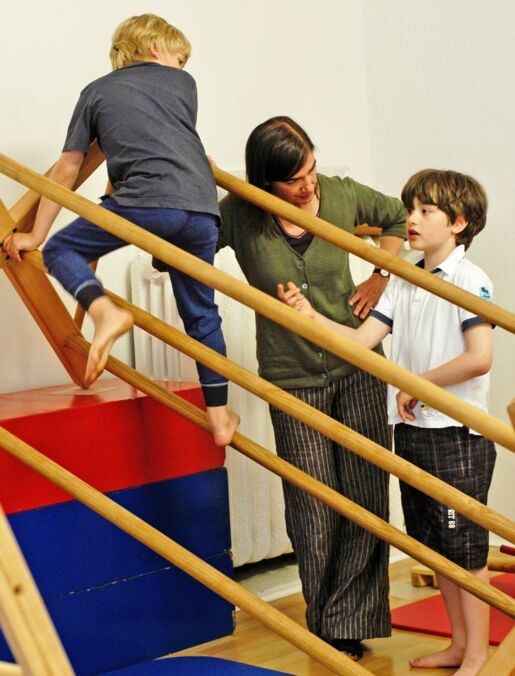
Groups
Climbing Group for Children from 4 1/2 to 6 Years
inspired by Elfriede Hengstenberg
In our group for movement and climbing we use the climbing and balancing equipment developed by Elfriede Hengstenberg and orientate ourselves on her way of working.
As a program of leisure activities, our group is open to all children between the ages of 4 and 6. The offer is particularly useful for children who are unsure of their movement behaviour due to their constitution or previous experience, without a specific indication for therapy. The children can gain differentiated movement experience and expand their skills in a protected environment and in a small, stable group without the pressure of expectations. Experiencing being successful without having to compete often has a positive effect on the child’s self-esteem. After about 40 minutes of „climbing-time“, the session can be concluded by building freely with smaller materials. Apart from the first session of familiarization, the children come to the climbing room unaccompanied. In our waiting area there is plenty of space for parents and younger siblings.
Thursdays, 15:30 - 16:30h, please inquire directly about costs
Course instructor: Anja Werner / Susanne Schagen, Physiotherapists
Information and registration via our practice
Inclusive Parent-Child Groups inspired by Emmi Pikler
For Children from 0 - 3 years
In Cooperation with the Pikler Gesellschaft Berlin e.V.
In a quiet, attentive atmosphere, these courses give children time to pursue their own interests in play and movement. You can await rooms with movement elements and selected play materials, carefully matched to the developmental level of the children. They broaden their social experience through encounters with other children. We adults observe the children’s joy of exploring, share our observations and work out answers to questions that arise as the children grow up. The basis for this is the respectful attitude towards children that characterizes the early education of Emmi Pikler.
Children with and without special needs are welcome!
Mondays:
Course Instructor: Silke Schmidt
Midwife, Pikler®Pedagogue
Email: Hebamme-silke@web.de
Fridays:
Course instructor: Patricia Lima Zahn
Preschool Teacher, Pikler®Pedagogue
Email: patricialimazahn@gmail.com
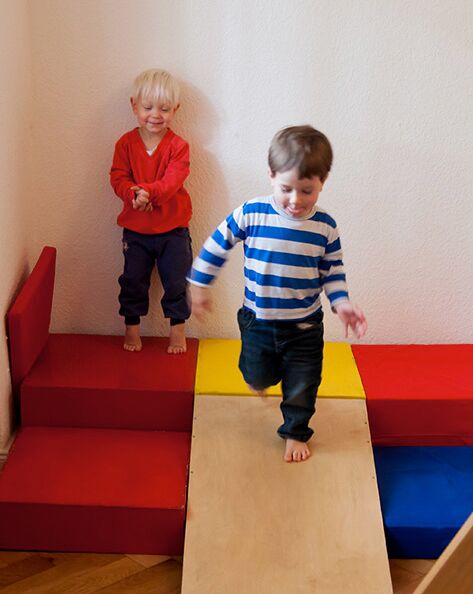
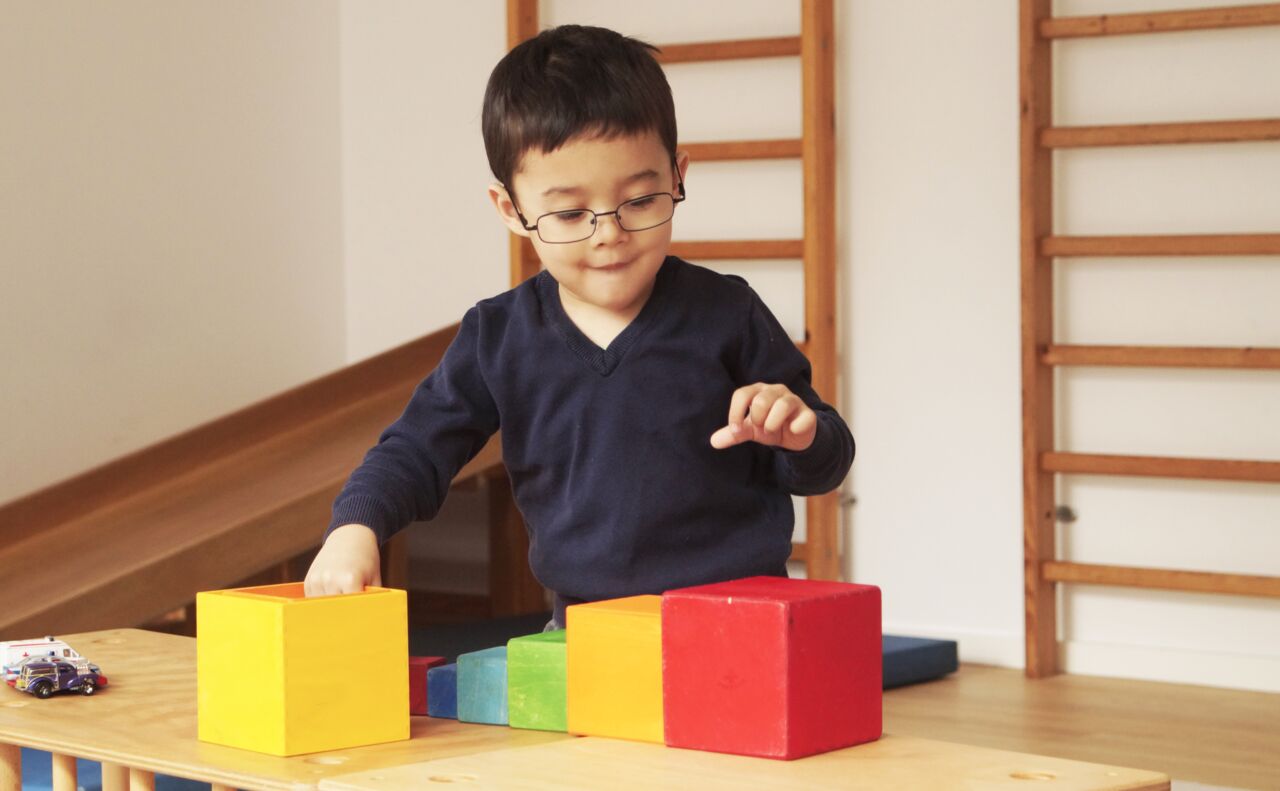
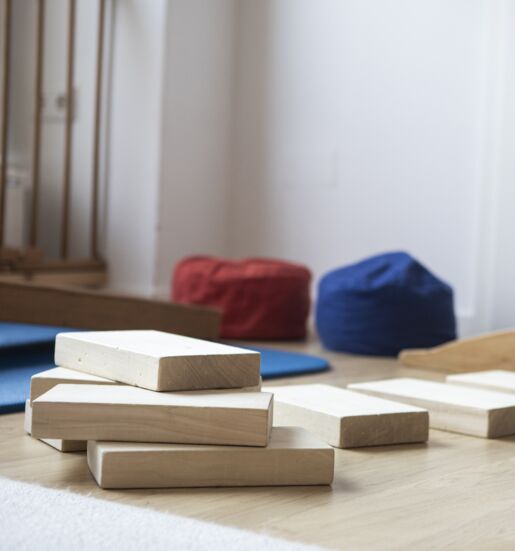
Offers of Groups for Adults
Hengstenberg Workshops for Adults with Pre-Experience
In irregular intervals, such as once a year, we offer Hengstenberg weekends for people with pre-experience. These weekends aim at deepening and experimenting in the sense of Elfriede Hengstenberg. By means of perception experiments, we can track down natural processes and needs, but also personal characteristics and particularities.
The Hengstenberg climbing equipment as well as all kinds of small materials are available in our rooms and offer plenty of opportunities for independent exploration. By individual experiences we can strengthen our understanding of the children’s experimenting. A professional exchange of experiences in working with children can be arranged according to demand. The course aims at people who are familiar with Hengstenberg’s approaches, for example through a Hengstenberg seminar within the Pikler training or in other contexts, and who are keen to learn more.
Course instructor: Anja Werner
Please enquire about dates, Information and registration via our practice
Supervision for Pikler Orientated Therapists
For therapists who work with children and already work with the Pikler concept, we offer supervision weekends about once a year. We use film material of the participants and discuss the questions arising from the work with young children and their families, like
- Which are the competences and difficulties of the child?
- What could be the next step?
- What kind of support is necessary? What is too much or not enough?
- What do the parents need and also what does the therapist need to support the child best as possible?
Perceptual experiments according to Else Gindler / Sensory Awareness enrich and deepen the joint reflection and sensing process.
Course instructors: Monika Aly, Anja Werner, Information and registration via our practice.
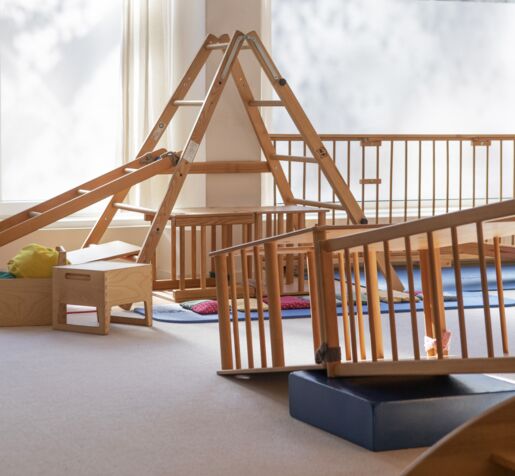
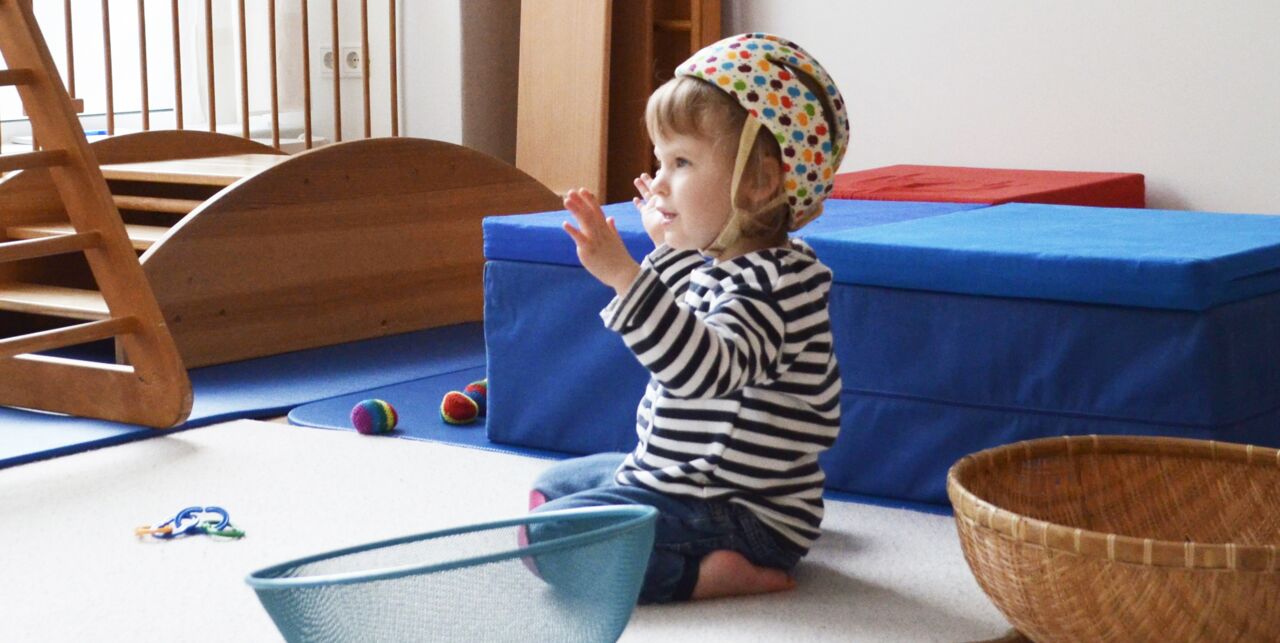
Philosophical Background of our Work
Here we introduce some personalities whose works are the foundation for the therapeutical work in our practice and for our inner attitude towards small children.
Dr. Emmi Pikler (1902–1984)
Already in the 30ties and 40ties of the last century the Hungarian paediatrician Dr. E. Pikler developed an early educational concept of which the full importance has only in recent times been recognized and appreciated.
To start with she worked as a medical doctor for families and after World War II she was in charge in Budapest of a home for babies and small children and committed herself to dealing with young children according to their needs which satisfied both their striving for autonomy and acting on their own in their learning process as well as satisfying emotional security and human relationships. What is characteristic for the Pikler methods of education is the autonomous development in movements and playing in an environment prepared according to the child's level of development and the peaceful, dialogical dealing of adults with children, for example in caring situations and in situations of social orientation.Directing special attention to the free and undisturbed development of movement was very important for E. Pikler. This was her main research in the 1960ies and she described the factors which led to a good quality of movement.
This insight is particularly important and helpful for us physiotherapists. During the training to become a Pikler Pedagogue the perception of all the child's utterances is being trained. Even the smallest steps in the development are noticed and appreciated. The motto "Give me time" which is characteristic for the Pikler education will help all children, with or without disabilities.
Nowadays the results of research and practical experiences of Emmi Pikler are more and more reflected in early caring situations, in parents-child-groups and families, but also used in the therapeutic context and academic field.
„Fundamentally it is important that the child will discover many things by itself. When we want to help the child solving all the tasks, then we steal from the child exactly that what is most important for its mental development. A child which gains insight into something by experimenting on its own will gain a totally different knowledge than a child who had been offered solutions“
(Emmi Pikler)
Elfriede Hengstenberg (1892–1992)
E. Hengstenberg used to be a gymnastics teacher who in Berlin worked mainly with school children. A significant influence on her method of working was given by Elsa Gindler and Heinrich Jacoby who trained the perception of adults to individual research of relevant behaviour in various activities. E. Hengstenberg, inspired by this, made it possible for children to experience autonomous experience and development. For this she used and developed materials which children could use to test their developmental abilities without being pushed or corrected by adults. They were allowed to discover something they were interested in by themselves. Hengstenberg's richness of ideas, filled with her deep understanding for children's needs and interests, was practically inexhaustible.
From the 1930ies onwards the contact between E. Hengstenberg and E. Pikler had grown. They realized that there was a relationship between their attitudes and remained connected in friendship and as colleagues until Pikler's death despite the Iron Curtain.
„In principle, the children can always explor and discover on their own and I prepare things and equipment in such a way as to encourage children to experiment with them. We all know these natural (original) movements of children which always aim at wanting to try out things on their own. We only should know more that overcoming these untiring resistances on their own will enable them to take their own initiative and it will gain the vigor which we hope it can retain and that the joy to deal with difficulties is due to letting it observe, explore and overcome difficulties by itself.“
(Elfriede Hengstenberg)
Monika Aly (*1945)
deficit-oriented therapy-methods she had learned as a young physiotherapist. In the 1970ies in Florence she found an approach which put children's competences and the participation in every day life into the centre of attention by Dr. Adriano Milani-Comparetti, a pionier for rehabilitation for children with infantile cerebral palsy. In 1982, she met E. Pikler at a conference in Göttingen where both women each held a speech, Monika Aly on the topic of own activity of children with disabilities and E. Pikler on the development of movement of healthy children acting on their own. Both women realized, that their thinking of the child as a protagonist of its development was in accordance with each other (they agreed in many points). In a close exchange with the medical doctor E. Pikler, as well as with Anne Tardos, a psychologist for children, Monika Aly connected the Pikler Early education with the therapy for young children. In 1989 M. Aly together with colleagues of the Pikler Gesellschaft Berlin e.V. as a sponsor, founded a further children's and Youth outpatient centre in Berlin-Wedding and Berlin-Schöneberg which nowadays are an integrated part of the VDK social-pedagogic centres.
In her role as a systemic family therapist Monika Aly advises families who have children with disablities. She is also an instructor in Pikler-pedagogics and in her role as a supervisor she also works in her home-country and abroad and has published numerous articles and literature in her field on pedagogical and therapeutic topics.
„This kind of therapy respects the autonomy of the child extremely and faces the fact that the movement of any human being is always directed by goals, wishes and imaginations. From these interrelations we can deduct that beside the development of movements also the development of the child's playing will always have to be taken into account - as a central expression of mental well being, intellectual activity, urge for knowledge and joyful experimenting and learning. This is true for all children but particularly so for children with delayed development or for disabled children.“
(Monika Aly)
Bertha Bobath (1907–1991)
The physiotherapist Bertha Bobath and her husband, the neurologist Karel Bobath, have developed from 1943 a treatment approach for patients with neurological impairments. Their interest was focused e.g. on patients after a stroke with hemiplegia or babies and children with impairment of the nervous system, e.g. infantile cerebral palsy, with their typical movement pattern. By taking part in courses of Elsa Gindler, Bertha Bobath became sensibilized for the interaction of movement and perception (sensomotoric) which formerly had not really been noticed.
The Bobath Approach which uses possibilities for compensation and the plasticity of the brain has since then been developed further under taking into account more recent neuroscientific knowledge and it is nowadays much more open than in the years of its beginning. The strength of neurophysiological treatment according to Bobath lies for example in taking notice of the reaction of the child to therapeutic intervention - diagnostic results and treatment are always seen together and matched one after the other also in view of the very exact provision of resources which serve to compensate missing movement and improve social participation.
Physiotherapy according to Bobath for children, on the medical prescription written as KG-ZNS-Kind (Bobath), is nowadays used for a broad spectrum of senso-motoric problems, because the holistic concept, which is individually adaptable, has proved worthwhile in many motoric queries during childhood.
„Movement is perception and perception is movement“
(Bertha Bobath)
Co-operation Partners/Links
We cooperate with the following organizations and associations and recommend the corresponding pages for further information
Pikler Society Berlin e. V.
www.pikler.de
Pikler Association Europe e. V.
www.pikler-verband.org
Pikler-Lóczy Társaság a Kisgyermekekért (Ungarn)
www.pikler.hu
Pikler UK Association
www.pikler.co.uk
Pikler International
www.piklerinternational.com
Practice for Physiotherapy Charlotte Mühlinghaus
www.physiotherapie-muehlinghaus.de
Heinrich Jacoby-Elsa Gindler-Foundation Berlin
www.jgstiftung.de
Basisgemeinde Wulfshagenerhütten eG
www.basisgemeinde.de
Kokomoo Versand
www.kokomoo.at

Contakt
Beweggründe
Practice Anja Werner
Wartburgstraße 18
10825 Berlin-Schöneberg
U Bayerischer Platz
U Rathaus Schöneberg
Buses M46, 104
(Bus stop: Rathaus Schöneberg)
T 030 236 31 297
F 030 497 60 232
physio.werner@gmx.de
www.beweggruende-berlin.de